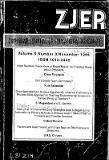| dc.contributor.author | Magagula, Cisko | |
| dc.coverage.spatial | Swaziland | en_GB |
| dc.date.accessioned | 2014-10-09T10:26:24Z | |
| dc.date.available | 2014-10-09T10:26:24Z | |
| dc.date.issued | 1994-11 | |
| dc.identifier.citation | Magagula, Cisko (1994) Head Teachers’ Perceptions of Power Bases: An Empirical Study about Swaziland. . ZJER, Vol 2. no.2. Harare. Mt. Pleasant: HRRC. | en_GB |
| dc.identifier.issn | 1013-3445 | |
| dc.identifier.uri | https://opendocs.ids.ac.uk/opendocs/handle/20.500.12413/4716 | |
| dc.description | A journal article. | en_GB |
| dc.description.abstract | As chief executives of schools, head teachers are often called upon to make demands or issue orders to staff members. Sometimes they need to resort to power to back up their demands and orders. The degree to which teachers listen and carry out head teachers’demands or orders is dependent, to some degree, on the perceived power bases.
The purposes of this study were to examine (i)the profile of high school head teachers of Swaziland, (ii) the power bases perceived by high school head teachers of Swaziland to be very effective in influencing staff members to comply with the head teachers’demands and orders; (iii) the extent to which high school head teachers felt satisfied or dissatisfied with the headship job, salary car loan, and housing allowance; (iv) the relationship between the background variables of high school head teachers and their level of satisfaction with the headship job, salary car loan and housing allowance; and (v) the relationship between the head teachers’ background characteristics and the perceived use of the power bases to influence staff members to comply with the head teachers’ orders and demands.
Data for this study were collected by a survey questionnaire mailed to 105 high schools in Swaziland. A self-addressed stamped envelope was enclosed for returning the completed questionnaire. Out of 105 mailed questionnaires, 63 (60%) were returned, of which 4 questionnaires were incomplete and therefore excluded from the analysis. In essence, the results of the present study are based on information provided by 59 (56%) high school head teachers out of a total of 105. | en_GB |
| dc.language.iso | en | en_GB |
| dc.publisher | Human Resource Research Centre, (HRRC), University of Zimbabwe. | en_GB |
| dc.rights.uri | http://creativecommons.org/licenses/by-nc-nd/3.0/ | en_GB |
| dc.subject | Education | en_GB |
| dc.subject | Politics and Power | en_GB |
| dc.subject | Work and Labour | en_GB |
| dc.title | Head Teachers’ Perceptions of Power Bases: An Empirical Study about Swaziland | en_GB |
| dc.type | Article | en_GB |
| dc.rights.holder | University of Zimbabwe | en_GB |


